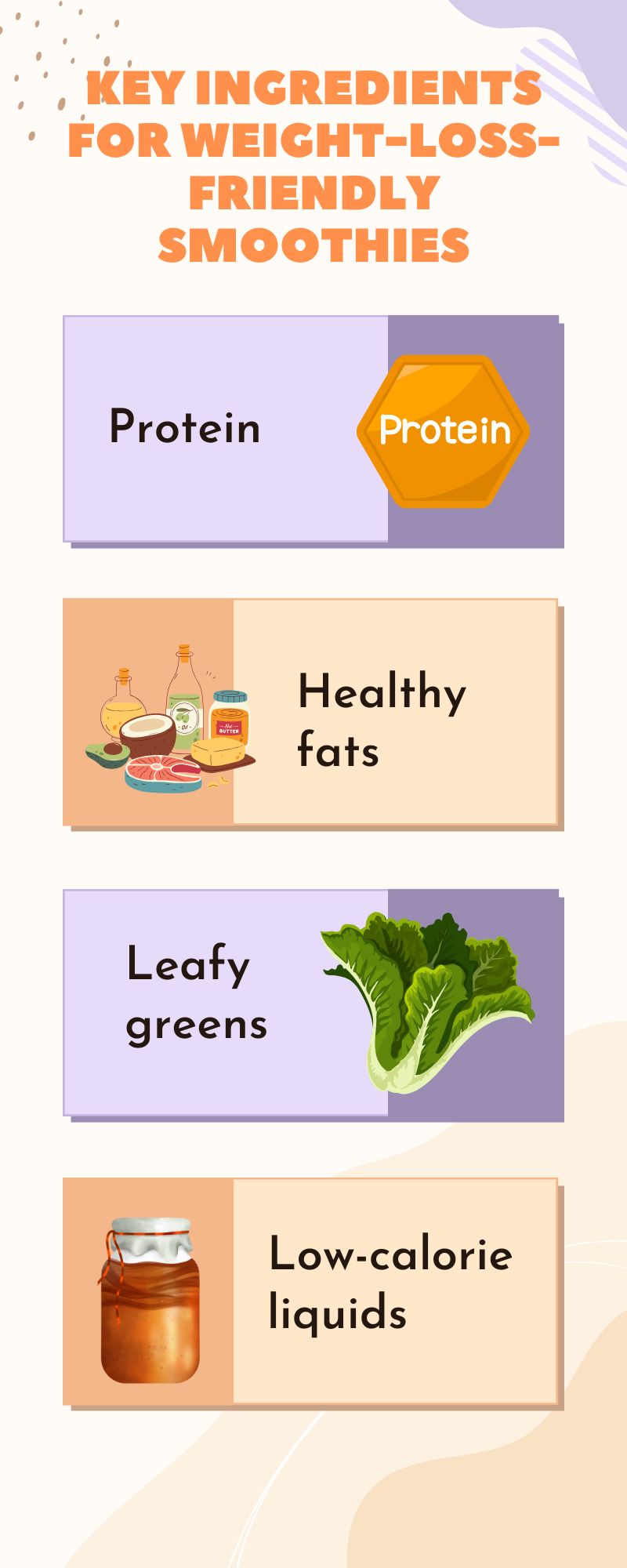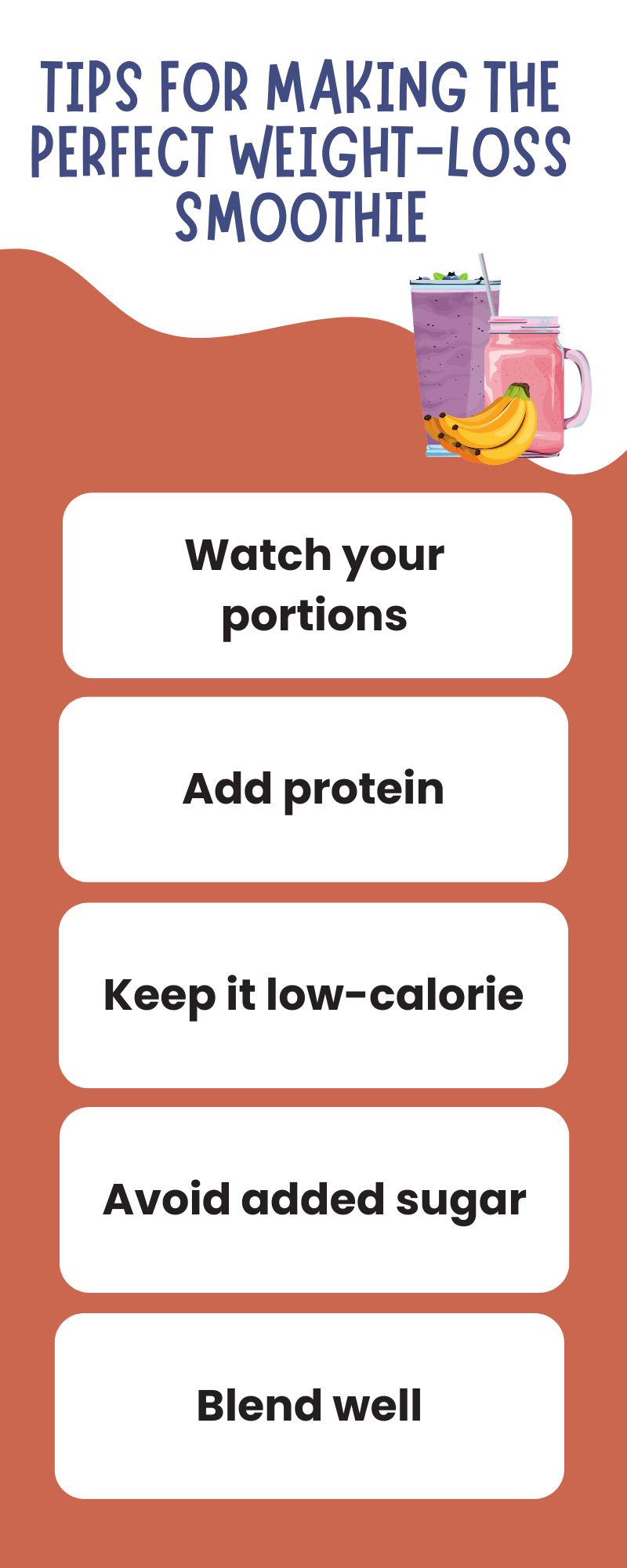Are you wondering if smoothies can actually help you lose weight? You’ve probably heard people say they’re healthy and great for shedding pounds, but is that really true?
The truth is, not all smoothies are created equal. Some can boost your weight loss efforts, while others might do the opposite. You’ll discover how to choose or make smoothies that support your goals and avoid common mistakes that could slow you down.
Keep reading to find out how smoothies can be your secret weapon on the path to a healthier, lighter you.

Smoothies And Weight Loss Basics
Smoothies are popular drinks made from blended fruits, vegetables, and liquids. Many people wonder if smoothies help with weight loss.
Some smoothies can support weight loss, but others may add extra calories. Understanding how smoothies affect your body is important.
How Smoothies Affect Calories
Smoothies can add calories quickly depending on their ingredients. Adding sugar, juice, or high-fat items raises calorie count.
Calories control weight loss. Eating fewer calories than you burn helps you lose weight. Some smoothies help control calories better than others.
- Fruit and vegetable smoothies often have fewer calories.
- Adding protein or healthy fats can increase calories but help feel full.
- Smoothies with added sugar or ice cream add many calories.
- Portion size matters; large smoothies may have too many calories.
Role Of Nutrients In Weight Management
Nutrients in smoothies affect hunger and energy. Protein, fiber, and healthy fats help control appetite.
Smoothies with these nutrients keep you full longer and reduce snacking. They support steady weight loss by balancing blood sugar.
- Protein supports muscle and keeps hunger low.
- Fiber slows digestion and adds fullness.
- Healthy fats provide energy and help absorb vitamins.
- Too much sugar can cause energy spikes and crashes.
Choosing The Right Ingredients
Making smoothies for weight loss means picking good ingredients. The right foods help you feel full and give nutrients.
Avoid adding things that add too many calories or sugars. Focus on fresh, natural foods that support your goals.
Best Fruits And Vegetables For Weight Loss
Choose fruits and vegetables with low calories and lots of fiber. Fiber helps you stay full longer and supports digestion.
- Leafy greens like spinach and kale
- Berries such as strawberries and blueberries
- Low-sugar fruits like green apples and pears
- Vegetables like cucumber and celery
- Avocado for healthy fats in small amounts
These foods add volume without many calories. They also give vitamins and minerals that your body needs.
Avoiding Hidden Sugars And High-calorie Additions
Many smoothie recipes add sweeteners or high-calorie ingredients. These can stop your weight loss progress.
- Skip adding honey, syrup, or sugar
- Watch out for flavored yogurt with sugars
- Avoid full-fat milk or cream
- Limit nut butters to small amounts
- Use water, unsweetened almond milk, or coconut water instead
Check labels if you use packaged ingredients. Many have hidden sugars that increase calories quickly.
Homemade Vs. Store-bought Smoothies
Smoothies can be a healthy choice for weight loss. You can make them at home or buy them ready-made. Both have pros and cons. Knowing the differences helps you pick the best option.
Homemade smoothies let you control the ingredients. Store-bought smoothies are quick and easy but may have added sugars. Let’s look closer at the key factors.
Nutritional Differences
Homemade smoothies usually have fresher ingredients and less sugar. You can add more fruits, vegetables, and protein. Store-bought smoothies may contain preservatives and sweeteners.
Many store-bought options have extra calories from sugars and syrups. Homemade versions let you control calories and nutrients. This helps with weight loss goals.
- Homemade smoothies: fresh fruits, vegetables, no added sugar
- Store-bought smoothies: may contain added sugar and preservatives
- Homemade allows for better portion control
- Store-bought can have hidden calories from syrups
Cost And Convenience Factors
Store-bought smoothies save time. You can buy and drink them on the go. They are convenient for busy days or travel. But they usually cost more per serving.
Homemade smoothies take time to prepare. You need fresh ingredients and a blender. They cost less over time and offer more servings. Planning can make homemade smoothies easier to fit into your day.
- Store-bought: quick, portable, higher cost per serving
- Homemade: requires prep, lower cost, can make large batches
- Homemade saves money but needs kitchen tools
- Store-bought is best for busy schedules

Smoothie Timing And Portion Control
Smoothies can be helpful for weight loss if you pay attention to when and how much you drink. Timing and portion control are key to getting good results.
Drinking smoothies at the right time and keeping servings reasonable can help control hunger and manage calorie intake.
Ideal Times To Drink Smoothies
Drinking smoothies at certain times helps your body use the nutrients well. A smoothie can be a good meal replacement or a healthy snack.
Try to avoid drinking smoothies late at night to prevent extra calorie intake that may not burn off.
- Morning: A smoothie can replace breakfast and boost energy.
- Before or after workouts: It helps fuel your exercise or aid recovery.
- Mid-afternoon snack: A smoothie can curb hunger and avoid unhealthy snacks.
Managing Serving Sizes For Results
Portion control is important to avoid drinking too many calories. Even healthy smoothies can add up if servings are too large.
Stick to servings between 8 and 12 ounces. Use measuring cups or a scale to keep your portions consistent.
- Use smaller glasses to control volume.
- Limit high-calorie ingredients like nut butters and sweeteners.
- Include fiber and protein to help you feel full longer.
Common Smoothie Mistakes To Avoid
Smoothies can be a healthy choice for weight loss. But some mistakes can stop you from losing weight.
Knowing what to avoid helps you make better smoothies. This guide highlights common errors people make.
Overloading With Calories
Adding too many high-calorie ingredients can make your smoothie unhealthy. It may cause you to gain weight instead of losing it.
Ingredients like full-fat yogurt, peanut butter, and sugary juices add many calories quickly. Watch the portions of these ingredients.
- Use low-fat or non-fat yogurt instead of full-fat
- Limit nut butters to one tablespoon
- Avoid adding sweetened juices or syrups
- Include more vegetables and fruits with low sugar
Relying Solely On Smoothies For Meals
Using only smoothies for all meals can cause nutritional gaps. Your body needs a variety of foods for good health.
Whole foods like vegetables, grains, and proteins give important nutrients. Smoothies should be part of a balanced diet, not the only food.
- Eat whole fruits and vegetables alongside smoothies
- Include lean proteins like chicken or beans in meals
- Consume whole grains for energy and fiber
- Use smoothies as snacks or meal supplements, not full meals
Incorporating Smoothies Into A Balanced Diet
Smoothies can be a helpful part of a weight loss plan. They offer a quick way to get fruits and vegetables.
It is important to include smoothies with other healthy foods. This helps keep your diet balanced and nutritious.
Combining With Whole Foods
Smoothies should not replace all meals. Eating whole foods like vegetables, fruits, and grains is important.
Whole foods provide fiber and nutrients that smoothies might lack. They also help you feel full longer.
- Include vegetables like carrots and spinach in your meals.
- Eat whole fruits instead of only drinking fruit smoothies.
- Choose whole grains such as brown rice or oats.
- Add lean proteins like chicken or beans to your diet.
Supporting Exercise And Lifestyle Changes
Smoothies work best with regular exercise. Physical activity helps burn calories and build muscle.
Healthy habits like drinking water and getting enough sleep support weight loss too. These changes improve overall health.
- Exercise at least 30 minutes most days of the week.
- Drink water instead of sugary drinks.
- Sleep 7 to 8 hours each night for good recovery.
- Reduce stress with relaxation or hobbies.
Real-life Success Stories
Many people try smoothies to help with weight loss. Smoothies can be a tasty and easy way to eat healthy foods.
Real stories from those who lost weight show how smoothies fit into a daily routine. These stories offer useful ideas and advice.
Personal Experiences With Smoothie-based Weight Loss
Sarah started replacing one meal a day with a vegetable and fruit smoothie. She lost 15 pounds in three months. She said smoothies helped her feel full and gave energy.
John added protein powder and greens to his morning smoothie. He found it easier to avoid unhealthy snacks. Over six months, John lost 20 pounds and improved his mood.
Lessons Learned And Tips
People learned that smoothies work best when balanced with solid meals. Drinking only smoothies can cause hunger and tiredness.
It is important to include protein, fiber, and healthy fats in smoothies. This keeps blood sugar steady and reduces cravings.
- Use fresh or frozen fruits and vegetables
- Add protein like yogurt, nuts, or protein powder
- Include healthy fats such as avocado or chia seeds
- Limit added sugars and sweeteners
- Drink smoothies with other healthy meals each day

Expert Opinions On Smoothies For Weight Loss
Smoothies are popular for quick meals and snacks. Many people wonder if they help with weight loss.
Experts share different views on how smoothies affect weight loss. Let’s see what they say.
What Nutritionists Say
Nutritionists say smoothies can be good for weight loss if made right. They should include whole fruits and vegetables.
Adding protein and fiber helps keep you full longer. Avoid adding too much sugar or juice.
- Use fresh or frozen fruits and veggies
- Add protein like yogurt or nuts
- Include fiber from seeds or oats
- Limit added sugars and sweeteners
Scientific Research Findings
Studies show smoothies can support weight loss when they replace high-calorie meals. They help control calorie intake.
Some research warns about smoothies with too much sugar. These can raise calorie count and reduce weight loss effects.
- Smoothies with balanced nutrients promote fullness
- High-sugar smoothies may cause weight gain
- Replacing snacks with smoothies can lower daily calories
- Portion size is important for weight control
Frequently Asked Questions
Are Smoothies Effective For Weight Loss?
Smoothies can aid weight loss when made with low-calorie, nutrient-rich ingredients. They replace high-calorie meals and reduce hunger.
What Ingredients Make Smoothies Good For Weight Loss?
Use fruits, vegetables, protein powder, and healthy fats. Avoid added sugars and high-calorie additives for best results.
How Often Should I Drink Smoothies For Weight Loss?
Drinking one smoothie daily as a meal replacement can support weight loss. Balance with whole foods for nutrition.
Can Smoothies Boost Metabolism For Weight Loss?
Smoothies with protein and fiber can slightly boost metabolism. They also keep you full longer, reducing overeating.
Conclusion
Smoothies can support weight loss when made wisely. Focus on whole fruits and vegetables. Avoid sugary ingredients and high-calorie extras. Portion control is key. Enjoy smoothies as a meal replacement or a healthy snack. Pair them with exercise and balanced meals for best results.
Listen to your body and monitor how it reacts. Adjust ingredients to meet your personal needs. Weight loss takes time and consistency. Healthy choices build long-term success. Make smoothies part of a balanced diet. Enjoy the journey to better health.



